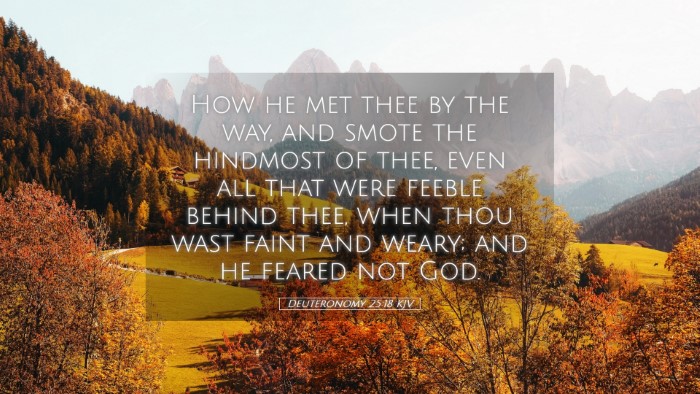Commentary on Deuteronomy 25:18
Verse: "How he met thee by the way, and smote the hindmost of thee, even all that were feeble behind thee, when thou wast faint and weary; and he feared not God."
Introduction
Deuteronomy 25:18 serves as a potent reminder of the perils faced by the Israelites during their journey. The verse specifically recounts the actions of the Amalekites as they ambushed the weaker and more vulnerable members of the community. In drawing from the rich interpretations provided by public domain commentaries, we uncover layered meanings that resonate deeply with the Christian faith and its theological underpinnings.
Historical Context
The Amalekites were among the first groups to attack the Israelites after their exodus from Egypt. Understanding this historical backdrop is essential to grasping the significance of the verse. The people of Israel, escaping slavery, were in a vulnerable position, and the attack by Amalek serves as a profound point of betrayal. Matthew Henry notes that the Amalekites could have chosen a different approach but decided to attack those who were weary and feeble — a choice highlighting a malicious intent.
Theological Insights
- Divine Justice: This verse has been interpreted as an illustration of divine justice. The passage encapsulates a profound moral lesson about the nature of sin, particularly how the strong may prey on the weak without due fear of God. Albert Barnes comments on this aspect, suggesting that such actions invoke God's ire and serve as a warning to nations and individuals alike.
- God's Protection: The lament over Amalek's actions also acts as a reminder of God’s promise to protect His people. Adam Clarke emphasizes that despite their frailty, God did not abandon the Israelites; rather, He used such incidents to strengthen their resolve and faith in His power and justice.
- Human Responsibility: Additionally, this verse prompts reflections on human responsibility. As pastoral leaders or theologians, understanding that we may sometimes be 'Amalek' in our actions towards others serves a dual purpose: it compels self-examination and fosters compassion towards the weak.
The Significance of the Attack
The method of attack employed by the Amalekites holds significance. They targeted the hindmost ranks — those who were tired and unprepared. This strategy depicts a broader theological theme concerning the believer's journey. Matthew Henry notes that spiritual journeys often leave individuals in vulnerable places, and it is often when believers are least prepared that they face attacks from adversaries.
Theological Reflection
The intentional assault on the weak by the Amalekites raises questions about the nature of evil in a broader sense. It pushes pastors and theologians to reflect on the spiritual warfare that adheres to the Christian life, where those who are weak and weary are often attacked. Clarke draws out this theme, indicating that the church must remain vigilant in aiding the weak and weary.
Application for Today
In today’s society, the lessons arising from Deuteronomy 25:18 are resoundingly relevant:
- Compassion for the Vulnerable: The call to protect the vulnerable echoes throughout Christian teaching. All followers of Christ are challenged to practice compassion, reaching out to those who may be marginalized or in distress.
- Awareness of Spiritual Warfare: The awareness that attacks may come when least expected compels believers to remain vigilant in faith. Pastors today can utilize this understanding to prepare congregations for spiritual challenges.
- Encouragement to the Weary: Just as God was with the Israelites, there is a divine continuity that offers hope. Pastors and leaders should remind the weary that they are not alone and that God is a refuge in times of need.
Conclusion
In conclusion, Deuteronomy 25:18 serves as a multifaceted source of reflection, challenge, and encouragement for believers. The historical accounts intertwined with theological insights make this verse relevant for pastors, students, and scholars alike. Engaging with this text not only encourages a deeper understanding of scripture but also fosters a commitment to embody the compassion demonstrated by God in the face of oppressors like the Amalekites. The insights from Matthew Henry, Albert Barnes, and Adam Clarke provide a firm foundation upon which the church can build regarding the steadfast protection, justice, and the call to defend the weak and vulnerable.


